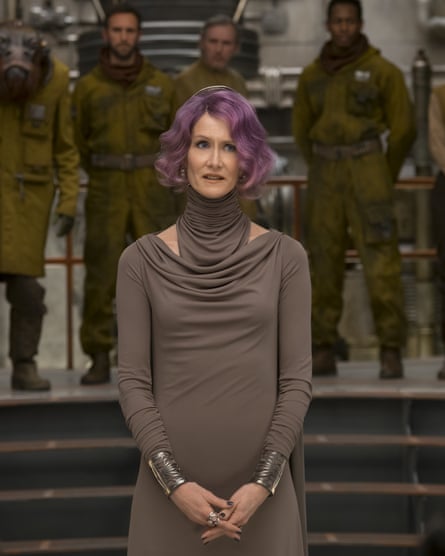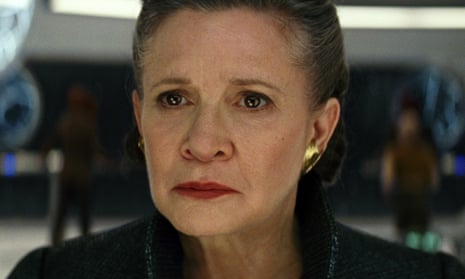The Last Jedi stormed into cinemas at the weekend as the most triumphantly feminist Star Wars film yet. While The Force Awakens and Rogue One had terrific heroines, they were isolated, and barely spoke to other women. Writer-director Rian Johnson has delivered a film that’s funny, exciting, spiritual and true to the original essence of the series while also having well-rounded female characters who actually interact with one another. Both in terms of women and non-white characters, there’s a celebratory inclusiveness that seems entirely in the Jedi spirit.
If you haven’t seen it, very mild spoilers are ahead. Rey (Daisy Ridley) is feeling the first stirrings of the Force and has gone in search of Luke Skywalker (Mark Hamill), who is living as a hermit on a remote island. The dynamic between them is complex and constantly evolving: these are no awe-struck pupil and saintly teacher archetypes. Rey’s character is as developed as any in the series, and bears no relation to her gender. Back at the Resistance HQ, General Leia (the late Carrie Fisher) is calmly calling the shots while her composed Vice Admiral Holdo (Laura Dern) is skeptical of our trigger-happy hero, Poe (Oscar Isaac). There are complex dynamics at work here, and gender seems significant in this case: the different sexes have varying approaches to military strategy, and it’s thought-provoking stuff.
It’s an impressive feat that within this two and a half hour movie, there is also room for a well-rounded Asian-American female character, Rose (Kelly Marie Tran) who goes on entertaining adventures with the intrepid Finn (John Boyega).
Among the approving voices is Annalise Ophelian, a documentary film-maker and psychologist whose current project, Looking for Leia, is about girls and women in Star Wars fandom. “The Last Jedi depicts women as multi-faceted, multi-generational, multi-racial. There are women in strong leadership positions and women who occupy student/learner positions,” she says.
The Last Jedi also contains what Ophelian says is the “first truly Bechdel Test passing scene” in the history of the franchise. “Female heroes are traditionally presented in cinematic isolation. This film gives us women working side by side, women in technical positions, and of course women learning the ways of the Force.”

Writer-director Gurinder Chada (Bend It Like Beckham) took her son to the premiere of The Last Jedi at the Royal Albert Hall. She felt the film had a distinctly feminine spirit, while still hitting all the classic Star Wars marks. “I thought it was a great version in terms of having all the lead women there. Laura Dern’s character is clearly very knowledgeable and there was a pathos with Leia, with Carrie Fisher having since passed away. That gave it a very gracious sensibility and tone which also helps it feel female driven. It was quite a gentle film. It delivered all the battles but I thought it was very spiritual compared to some other ones.”
Other commentators think the Star Wars series has always been ahead of the curve. “The franchise has been a trailblazer for women in command,” says Beth Webb, a film journalist and programmer for the Bechdel Test Fest, an ongoing celebration of women in film. “Aside from Leia, I particularly admired Felicity Jones’ Jyn in Rogue One. But it’s certainly thrilling to see these two powerhouse women be leaders, on screen, at the same time. There’s no rivalry or tension, just two old friends working together for a cause bigger than themselves. To see a franchise dear to my heart finally exceeding all of my expectations for its female characters makes it all worth it.”
Here’s hoping the post-Weinstein era is finally ushering in the changes so many feminists have been campaigning for in film. Says Webb: “We’re already seeing it in next year’s big releases, from A Wrinkle in Time to Lady Bird to Ocean’s Eight, and we’ve got solid proof in record-breaking box office figures and Metacritic scores to back us up. Wonder Woman was one of the highest-grossing superhero origin films of all time. Girls Trip was the first comedy of the year to cross the $1m mark. Lady Bird broke the Rotten Tomatoes record. And television is already light years ahead.”
But both Webb and Ophelian have one more new hope for Star Wars. ‘The next step is a female director, which I’m hoping the rapidly expanding franchise will allow,” says Webb. Tellingly, Rian Johnson, who will also direct the first film in a new Star Wars trilogy, has agreed. “There are so many incredibly talented female directors, directors of colour out there, and so many that I would love to see play in this universe. So hell yes, please, I’d love it to happen.”

Comments (…)
Sign in or create your Guardian account to join the discussion